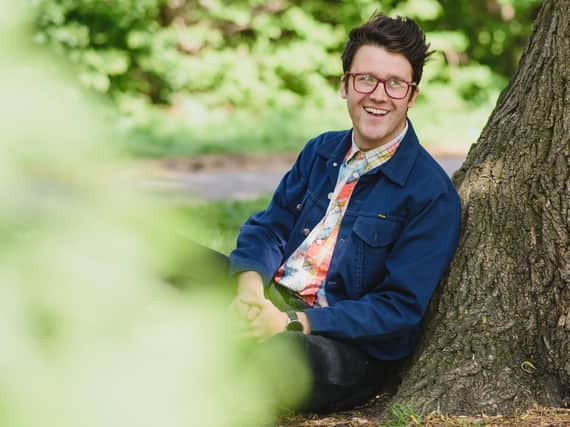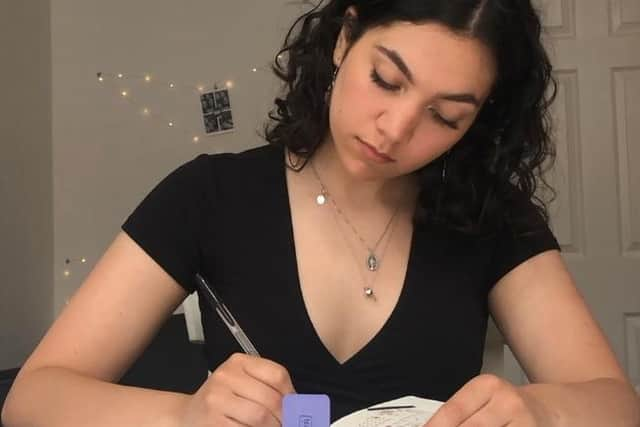'I try to champion the underdog and inspire change', says poet Matt Abbott
This article contains affiliate links. We may earn a small commission on items purchased through this article, but that does not affect our editorial judgement.


“Everyone assumes that you have to have a degree in English to become a poet - do this course and that training...I love the fact that a lad from Wakey who didn’t go to university has managed to become a patron for young poets.”
If Matt Abbott’s roots in the county aren’t evident from his comforting Yorkshire tones at the other end of the phone, his affectionate slang reference to his home city certainly gives it away.
Advertisement
Hide AdAdvertisement
Hide AdHe grew up in the market town of Ossett, the son of a coal miner and it was there the foundations were laid for, in his words, “a weird career”.


It’s certainly been varied; he has toured the UK with indie-pop act Skint & Demoralised, written a poem for Jeremy Corbyn’s election campaign, become an ambassador for Halifax’s Eureka! museum and published his first collection of poetry for children.
Now, aged 31, he can add becoming a patron for The Poetry Society’s prestigious Foyle Young Poets of the Year competition to his ever-growing CV. “I was really honoured when they got in touch with me and asked me to be one of the patrons,” he says.
“The competition is something that I’ve known about most of my career, although much to my regret, I didn’t find out about it until I was too old to apply. It’s very prestigious so when they asked me to be a patron I was buzzing.”
Advertisement
Hide AdAdvertisement
Hide AdFoyle is the biggest poetry competition for 11 to 17-year-olds in the world, with young people invited to submit as many poems as they wish. Entries to the contest close on Friday and this year has already seen a rise in submissions on last year, with both the number of poems and number of entrants up by more than 100 per cent.
Matt, who now lives in London, believes more young people are turning to poetry to express how they feel about current political and social issues and to make sense of the world around them.
“Having a voice is one of the most important things you can have,” he says. “Young people are looking for something deeper and I feel like there’s so many issues now on their radar - Black Lives Matter has been a big one recently, Brexit, climate change is a huge issue - and I don’t think they always feel like they have a voice in the world, mainly because they can’t vote. I feel like young people are becoming a lot more savvy and switched on to what’s happening in the world and turning to poetry as an obvious way of expressing it.”
For many, poetry has been a way to tap into feelings and emotions during the unprecedented lockdown period. “I think using poetry as a way to first of all access other people’s thoughts but second of all to express your own, for me, is a really soothing art form. It’s been a great thing for people to turn to.
Advertisement
Hide AdAdvertisement
Hide Ad“Also someone who has never written a poem before in their life could feasibly pick up a pen and write a poem during lockdown. I’m not saying it is immediately going to be good, but if you wanted to write a song, you’d need an instrument, learn to read and write music, get familiar with chords, whereas writing a poem, you can get out your phone, open your notes and type away.”
Poetry didn’t start to resonate with Matt until he was 17, studying at what is now known as Ossett Academy and Sixth Form College. The foundations were there in his earlier years though; he’d always been “obsessed” with storytelling and song lyrics.
“I’m from a line of coal miners - my dad was a coal miner, my grandad was a coal miner - and through that you get a lot of stories. Storytelling and song lyrics were two things I was always obsessed with, I’d just never made the connection with poetry. And because so often poetry at school is dull and inaccessible and complex, I never would have thought about it in a million years.”
He still believes the way poetry is taught in the classroom can be “boring, complicated and old fashioned” but he says things like Ted Talks, the prominence of female poets such as Kate Tempest and Holly McNish and the popularity of slam poetry and spoken word, particularly on social media, are helping to engage more young people in the art form.
Advertisement
Hide AdAdvertisement
Hide AdFor Matt, it was the discovery of performance poets such as John Cooper Clarke and Linton Kwesi Johnson that sparked his interest in writing himself. He became a compere at live music venue Escobar, once a staple of Wakefield’s nightlife and would introduce the acts, performing short sets of his poetry in between. “It really excited me doing poetry in a music setting,” he recalls. “I’d always wanted to be in a band but wasn’t cool enough.”
In May 2007, he was contacted by a Sheffield-based songwriter and producer, who began layering Matt’s poems over electro-instrumentals and the partnership soon developed into Skint & Demoralised. They signed a record deal and released three albums between 2007 and 2013.
Since returning to poetry seven years ago, Matt has toured UK theatres, took his debut show Two Little Ducks - exploring the working class Leave vote in EU referendum and reflecting on his experience volunteering at the Calais Jungle refugee camp - on the road in 2018, and has been commissioned to create a range of work including by Nationwide Building Society, former Labour leader Jeremy Corbyn and his beloved football team Leeds United, for the club’s centenary year.
Perhaps his biggest achievement though is the release last year of A Hurricane in my Head, his first poetry collection for children. “The kids’ poetry collection being published by Bloomsbury, a massive publisher who did Harry Potter, is for me the thing I am most proud of and the fact it was picked up by Blue Peter and National Poetry Day. I’m proud of that because the thing that excites me most is writing for a younger generation. If I inspire someone who is 11, 12, 13 that’s the greatest thing I could achieve.”
Advertisement
Hide AdAdvertisement
Hide AdIndeed, through his Foyle role, Matt hopes to engage with young people in an inspiring way. Previous winners of the competition - 15 are chosen each year - have certainly taken encouragement from being involved and say winning has provided them with a platform they would not likely otherwise have had.
Maiya Dambawinna, for example, was a winner of the Foyle competition in 2018 and the 19-year-old from Leeds has since been published in various magazines and is a contributing editor for Iceberg Tales literary magazine.
“When you enter, it kind of gives you permission to say I am a poet,” she says. “When you tell people, I write poetry, if you’re just saying it’s in your room, it’s in a notebook, it doesn’t really feel as real as saying I’ve got this big achievement behind me. Winning it was really quite life-changing.
“Having the backing of saying I’m a former Foyle young poet has absolutely helped me. You write your poetry biography when you submit to competitions or magazines and obviously the more you have on it, the more impressive it looks.
Advertisement
Hide AdAdvertisement
Hide Ad“The reason that I’m with the magazine is because my editor messaged me having seen my work from the Foyle competition and had been following what I’d been writing since. I wouldn’t have had that opportunity without Foyle.”
In a similar vein, Lauren Hollingsworth-Smith, who was a winner last year, recently won the 2020 New Poets prize and is having her first pamphlet published next year.
“Without winning the Foyle, I don’t think I would have had the confidence to enter my own collections into competitions or have honed my skills enough,” the 18-year-old from Rotherham says. “I’ve also been introduced to other friends in the poetry community and it’s really good to be introduced to other people you can share your ideas and thoughts with...It’s given me a massive confidence boost and also a lot of attention. I feel like I’m taken seriously as a writer and recognised. That’s an amazing thing.”
Back to Matt, and the poet is now working on two follow up collections for young people, one aimed at primary school age and the other for teenagers. He’s also creating a verse novel, exploring the topic of privilege and the experiences he has had as a straight, white man.
Advertisement
Hide AdAdvertisement
Hide AdAsked how he describes himself as a poet, Matt says: “I’m very much seen as an activist. I write a lot about social issues, human struggle and political issues. My kids' stuff does talk about social issues but can’t be anywhere near as political. I’m straddling two different worlds but what I hope is just for my poetry, no matter who it’s aimed at, to champion the underdog and hopefully inspire some sort of change.
“I think the most important thing is to write about what you’re passionate about and I’ve always been obsessed with politics and social issues. I’d probably be more popular as a poet if I stayed away from politics because it’s quite a divisive issue, but I don’t care. That’s what I’m passionate about and want my work to reflect.”
His advice for those entering Foyle? “Have faith in your own voice,” he says. “Too many people, myself included, start off writing how they think they should sound or how somebody else sounds...Try and be as natural and true to yourself as possible. Use your voice.”
Visit foyleyoungpoets.org
For more stories from the YP Magazine and The Yorkshire Post features team, visit our Facebook page.
Advertisement
Hide AdAdvertisement
Hide AdEditor’s note: first and foremost - and rarely have I written down these words with more sincerity - I hope this finds you well.
Almost certainly you are here because you value the quality and the integrity of the journalism produced by The Yorkshire Post’s journalists - almost all of which live alongside you in Yorkshire, spending the wages they earn with Yorkshire businesses - who last year took this title to the industry watchdog’s Most Trusted Newspaper in Britain accolade.
And that is why I must make an urgent request of you: as advertising revenue declines, your support becomes evermore crucial to the maintenance of the journalistic standards expected of The Yorkshire Post. If you can, safely, please buy a paper or take up a subscription. We want to continue to make you proud of Yorkshire’s National Newspaper but we are going to need your help.
Postal subscription copies can be ordered by calling 0330 4030066 or by emailing [email protected]. Vouchers, to be exchanged at retail sales outlets - our newsagents need you, too - can be subscribed to by contacting subscriptions on 0330 1235950 or by visiting www.localsubsplus.co.uk where you should select The Yorkshire Post from the list of titles available.
Advertisement
Hide AdAdvertisement
Hide AdIf you want to help right now, download our tablet app from the App / Play Stores. Every contribution you make helps to provide this county with the best regional journalism in the country.
Sincerely. Thank you.
James Mitchinson